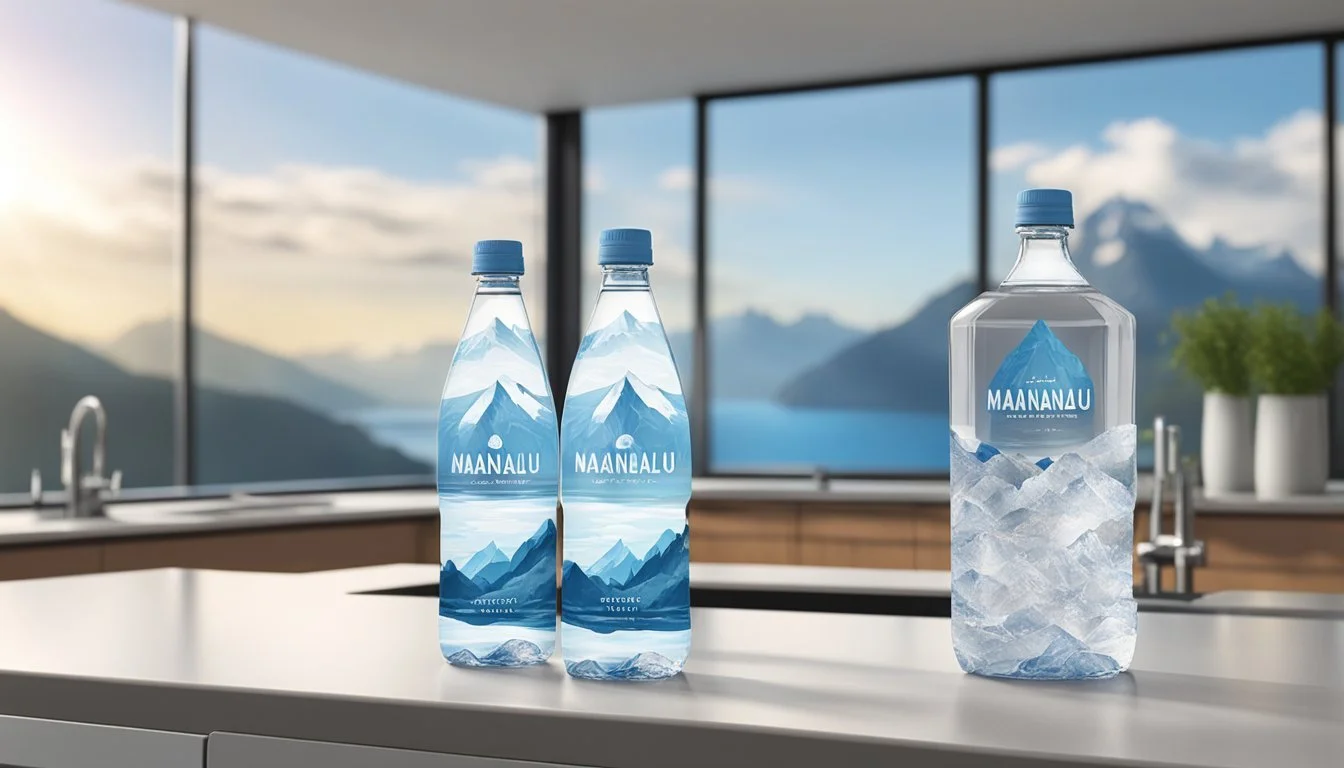Ice Mountain vs. Mananalu
Best Bottled Water Comparison
Choosing the best bottled water can be a balancing act between taste, quality, and environmental impact. When comparing Ice Mountain and Mananalu, the differences emerge in their production processes and sustainability efforts.
Ice Mountain, known for its multi-step filtration process, provides a clear, refreshing taste that many appreciate. Mananalu, pioneered by actor Jason Momoa, shifts attention with its focus on eliminating single-use plastic by packaging in aluminum bottles. This eco-friendly approach adds significant value to Mananalu's appeal.
For consumers prioritizing taste and purity, Ice Mountain's rigorous filtration might win their favor. Yet, those keen on reducing their environmental footprint could find Mananalu's packaging innovation particularly compelling.
Understanding Bottled Water
The popularity of bottled water has grown significantly due to its convenience and perceived purity. This section covers the evolution of bottled water and the regulations that ensure its safety and quality.
The Evolution of Bottled Water
Bottled water has ancient origins, with early examples dating back to Roman times. However, its commercial production began in the 18th century. Early on, bottled water was marketed as having medicinal properties.
In modern times, brands like Ice Mountain and Mananalu have refined their production processes. Ice Mountain employs a multi-step filtration process, while Mananalu focuses on sustainability by packaging water in recyclable aluminum cans.
Different sources such as natural springs, artesian wells, and municipal water supplies contribute to the variety available today.
Bottled Water Regulations
Regulating bottled water is essential for ensuring health and safety. In the United States, the Environmental Protection Agency (EPA) oversees tap water, while the Food and Drug Administration (FDA) regulates bottled water.
Key Standards Include:
Quality: Bottled water must meet standards for microbial, chemical, and radiological content.
Labeling: Clear labeling is required to inform consumers about the water source and any treatments.
Safety: Regular testing for contaminants like lead, chlorine, and harmful pathogens.
These regulations help maintain high safety levels, ensuring that drinking water is pure and safe for consumption.
Ice Mountain and Mananalu: A Comparative Analysis
This analysis explores the distinctive features of Ice Mountain and Mananalu, focusing on brand profiles, water sources and purity, taste profiles, and health and quality benefits.
Brand Profiles
Ice Mountain is a widely recognized bottled water brand that sources its water from natural springs in Michigan. Known for its affordability and availability, Ice Mountain offers a range of bottled water options, including natural spring water.
Mananalu, founded by actor Jason Momoa, is a mission-driven brand aimed at reducing single-use plastics. Its water, offered in 100% recyclable aluminum cans, emphasizes environmental sustainability.
Both brands cater to consumers who value both water quality and environmental impact.
Source and Purity
Ice Mountain sources its water from multiple springs in Michigan, known for their naturally occurring glacial filters. This process ensures high purity levels and maintains a natural mineral balance.
Mananalu sources purified water that undergoes rigorous filtration to remove contaminants. The emphasis here is on providing clean, safe drinking water while also promoting environmental sustainability.
While Ice Mountain focuses on natural spring water, Mananalu prioritizes purified water with an eco-friendly mission.
Taste Profiles
Ice Mountain is often praised for its clean, crisp taste, which can be attributed to its natural spring sources and careful filtration process. The mineral content is well-balanced, providing a refreshing drinking experience.
Mananalu also delivers a clean taste but may lean towards a more neutral profile due to its purification methods. The absence of strong mineral flavors makes it a versatile option for various uses, from hydration to cooking.
Both brands offer a satisfying taste, though their flavor profiles reflect their different sourcing and processing methods.
Health and Quality
Ice Mountain boasts a naturally alkaline pH, adding to its health benefits. The presence of essential minerals and electrolytes supports hydration and overall well-being. Quality control ensures that each bottle meets safety and purity standards.
Mananalu focuses on purified water that is free from contaminants. The brand’s commitment to sustainability does not compromise its high standards for cleanliness and water quality.
Consumers can trust both brands for safe, high-quality drinking water, though they may choose based on their preference for natural spring versus purified water.
Impact on Health and Bodily Functions
Both Ice Mountain and Mananalu bottled waters are popular for their contributions to health and proper bodily functions. This section highlights their roles in hydration and electrolyte balance, as well as potential contaminants and safety concerns.
Hydration and Electrolyte Balance
Ensuring proper hydration is crucial for maintaining bodily functions. Ice Mountain water is mineral-rich, providing essential electrolytes like calcium and magnesium, which support muscle function and nerve signaling. Minerals also enhance the flavor, appealing to health-conscious consumers.
Mananalu water, bottled in aluminum, focuses on sustainability but also ensures effective hydration. While it might have fewer added minerals compared to Ice Mountain, its mission to provide clean water without single-use plastics attracts eco-friendly individuals.
Electrolytes in bottled water help maintain fluid balance, regulate blood pressure, and aid in muscle contraction. Both brands offer different compositions, but both support hydration and bodily functions effectively.
Contaminants and Safety Concerns
Safety is paramount when choosing bottled water. Ice Mountain adheres to strict safety standards to ensure its water is free from harmful contaminants like lead and PFAS chemicals. Regular testing guarantees the absence of dangerous substances, ensuring consumer health.
Mananalu also commits to high safety standards. Its aluminum bottles reduce concerns about microplastics common in plastic bottles. Mananalu’s dedication to removing plastics from oceans, in partnership with rePurpose Global, adds a layer of environmental consciousness without compromising safety.
Both brands prioritize offering clean, safe water. While Ice Mountain focuses on mineral content and traditional safety measures, Mananalu advocates for plastic-free options, balancing health and environmental impacts.
Environmental Implications
The comparison between Ice Mountain and Mananalu highlights notable differences in their environmental impacts, especially regarding plastic use, sustainable packaging, and overall environmental footprint.
Plastic Use and Waste
Ice Mountain primarily utilizes plastic bottles, often derived from petrochemicals. These bottles, while technically recyclable, contribute significantly to plastic waste due to low recycling rates. The widespread use of plastic has a substantial environmental impact, leading to pollution and harming marine life.
In contrast, Mananalu, founded by Jason Momoa, aims to minimize plastic waste by offering water in 100% recyclable aluminum cans. This approach helps reduce the reliance on single-use plastic bottles, addressing a critical issue in environmental sustainability. Additionally, Mananalu's partnership with rePurpose Global further emphasizes their commitment by removing an equivalent amount of plastic from ocean-bound waste for every bottle sold.
Sustainable Packaging and Recycling
Ice Mountain's plastic bottles present challenges in sustainable packaging due to the reliance on non-renewable resources like oil. Despite being widely recyclable, the actual recycling rate remains disappointingly low, contributing to long-term environmental issues. The production and disposal of plastic bottles lead to increased carbon emissions and potential for landfill accumulation.
Mananalu, on the other hand, uses aluminum cans which boast a higher recycling rate. Aluminum can be recycled multiple times without degrading in quality, making it a more sustainable option. This choice significantly reduces the environmental footprint, promoting a circular economy where materials are reused, thus lowering overall resource extraction and waste.
Environmental Footprint of Water Brands
The environmental footprint of Ice Mountain includes the complete lifecycle of its plastic bottles, from production to disposal. The extraction and refining of petrochemicals, bottle manufacturing, and limited recycling participation contribute to a higher carbon footprint. Each stage generates emissions and waste, which cumulatively add to environmental degradation.
Mananalu's use of 100% recyclable aluminum cans results in a lower environmental footprint. Their production processes focus on sustainability, aiming to reduce greenhouse gas emissions and energy consumption. Additionally, the company's active role in removing plastic waste from the environment exemplifies a commitment to reducing their ecological impact. This approach aligns with global efforts to combat plastic pollution and promote sustainable consumption practices.
Techniques in Water Filtration and Purification
Water filtration and purification involve multiple techniques to remove contaminants and ensure clean drinking water. These methods range from reverse osmosis and distillation to ultraviolet light and carbon filtration.
Reverse Osmosis and Distillation
Reverse osmosis is a widespread method that forces water through a semi-permeable membrane, removing up to 99% of dissolved salts, bacteria, and other impurities. This process is extensive, often involving pre-filtration to eliminate larger particles, followed by the reverse osmosis phase.
Distillation, another purification technique, heats water to create vapor, separating it from contaminants. The vapor is then cooled to produce distilled water. This method is highly effective against most contaminants, particularly heavy metals and pathogens.
Ultraviolet Light and Carbon Filtration
Ultraviolet (UV) light purification uses UV rays to destroy microorganisms. As water passes through a chamber equipped with UV lamps, the rays disrupt the DNA of bacteria, viruses, and other pathogens, rendering them harmless.
Carbon filtration uses activated carbon to remove chlorine, volatile organic compounds (VOCs), and chlorine byproducts. This process significantly improves the taste and odor of water by trapping contaminants in the porous carbon material.
Both UV light and carbon filtration are often combined with other methods to comprehensively purify water and ensure it is safe for consumption.
Consumer Considerations
When choosing between Ice Mountain and Mananalu, consumers often look into factors like convenience, lifestyle compatibility, cost, and value. Both brands offer distinct features that cater to specific needs and preferences.
Convenience and Lifestyle Choices
Ice Mountain is widely available in various retail outlets, making it a convenient choice for those who prefer easily accessible bottled water. Mananalu focuses on sustainability with its recyclable aluminum cans. This environmental mission makes it an attractive option for eco-conscious consumers who prioritize reducing plastic waste.
For those with a health-conscious lifestyle, factors like the water's purity and source are important. Ice Mountain undergoes a rigorous filtration process to ensure quality, while Mananalu provides purified water, appealing to those who prioritize clean and safe drinking options.
Availability and packaging are key elements influencing consumer decisions. Ice Mountain aligns with a traditional convenience model, whereas Mananalu stands out in eco-friendly packaging, appealing to different lifestyle choices.
Cost and Value Assessment
Cost is a significant consideration for many consumers comparing Ice Mountain and Mananalu. Ice Mountain is generally priced competitively within the market, making it an affordable option for everyday use. In contrast, Mananalu, with its focus on environmental sustainability, tends to fall into the category of more expensive water.
Value assessments often include the quality and taste of the water. Ice Mountain's multi-step filtration process promises a clean and refreshing taste, similar to well-known brands like Life WTR and Nestlé Pure Life. Mananalu also emphasizes quality water, but its primary value proposition is its sustainable approach, resonating with those willing to pay a premium for recycling initiatives.
While Ice Mountain offers practical value with widespread availability and competitive pricing, Mananalu provides added value through its environmental commitment, appealing to those who see long-term value in sustainability.
Future Trends in the Bottled Water Industry
The bottled water industry is rapidly evolving, driven by various consumer demands and technological advancements. Emerging trends suggest that eco-friendly packaging will dominate the market.
Environmental considerations are crucial. Consumers and companies are increasingly seeking sustainable options. Jason Momoa's Mananalu exemplifies this with its aluminum bottles aimed at reducing single-use plastic. Initiatives like "Drink One, Remove One" demonstrate a strong environmental mission.
Smartwater has also adopted eco-friendly measures. Their recent shift to 100% recycled plastic bottles aligns with environmental demands, showcasing an industry-wide move towards sustainable packaging solutions.
According to a Grand View Research report, the U.S. bottled water market is projected to grow significantly, driven by rising concerns about water contamination. The Food and Drug Administration continues to enforce stringent safety and quality controls, ensuring consumer access to safe bottled water.
The International Bottled Water Association (IBWA) supports these developments by promoting industry standards and environmental responsibility. They advocate for improved recycling systems and sustainable practices across all brands.
Another notable trend is personalized hydration solutions. Brands are leveraging technology, like smart caps and apps, to offer tailored hydration advice, meeting individual health and lifestyle needs.
In summary, the bottled water industry is leaning heavily towards sustainability, technological innovation, and increased consumer safety. Brands must adapt to these trends to remain competitive and appeal to environmentally-conscious consumers.
More About Ice Mountain
Core Hydration vs Ice Mountain: Which Bottled Water is Better?
Ice Mountain vs Aqua Carpatica: Which Bottled Water is Better?
Ice Mountain vs Cascade Mountain: Which Bottled Water is Better?
Ice Mountain vs Crystal Geyser: Which Bottled Water is Better?
Ice Mountain vs Crystal Lake: Which Bottled Water is Better?
Ice Mountain vs Essence pH10: Which Bottled Water is Better?
Ice Mountain vs Hawaii Volcanic: Which Bottled Water is Better?
Ice Mountain vs Hawaiian Springs: Which Bottled Water is Better?
Ice Mountain vs Icelandic Glacial: Which Bottled Water is Better?
Ice Mountain vs Kirkland Signature: Which Bottled Water is Better?
Ice Mountain vs Liquid Death: Which Bottled Water is Better?
Ice Mountain vs Mountain Valley Spring Water: Which Bottled Water is Better?
Ice Mountain vs Nestle Pure Life: Which Bottled Water is Better?
Ice Mountain vs Poland Spring: Which Bottled Water is Better?
Ice Mountain vs Proud Source: Which Bottled Water is Better?
Ice Mountain vs Purely Sedona: Which Bottled Water is Better?
Ice Mountain vs Richard's Rainwater: Which Bottled Water is Better?
Ice Mountain vs San Pellegrino: Which Bottled Water is Better?
Ice Mountain vs Simple Truth: Which Bottled Water is Better?
Ice Mountain vs Solan de Cabras: Which Bottled Water is Better?
Ice Mountain vs Talking Rain AQA: Which Bottled Water is Better?
Ice Mountain vs Whole Foods 365: Which Bottled Water is Better?
Ice Mountain vs Whole Foods Italian Still Mineral water: Which Bottled Water is Better?
More About Mananalu
Hawaiian Springs vs Mananalu: Which Bottled Water is Better?
Icelandic Glacial vs Mananalu: Which Bottled Water is Better?
Mananalu vs Cascade Mountain: Which Bottled Water is Better?
Mananalu vs Kirkland Signature: Which Bottled Water is Better?
Mananalu vs Richard's Rainwater: Which Bottled Water is Better?
Mananalu vs Talking Rain AQA: Which Bottled Water is Better?
Mananalu vs Whole Foods Italian Still Mineral water: Which Bottled Water is Better?
Mountain Valley Spring Water vs Mananalu: Which Bottled Water is Better?
Nestle Pure Life vs Mananalu: Which Bottled Water is Better?








